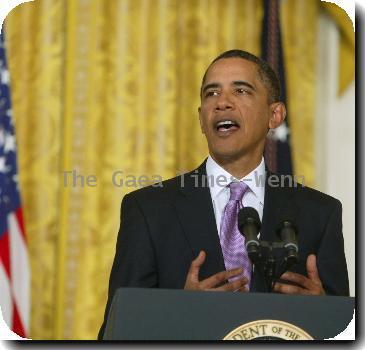AP-GfK poll shows rising support for health care law; Americans still divided on impact
By Trevor Tompson, APThursday, June 17, 2010
AP-GfK poll shows gains for health care overhaul
WASHINGTON — The patient is alive and kicking. A new Associated Press-GfK poll finds public support for President Barack Obama’s new health care law has risen to its highest point.
The nation remains divided, with 45 percent in favor and 42 percent opposed to the president’s signature domestic accomplishment.
Still, the shift in public sentiment was significant. Opposition to the overhaul increased after Congress passed it in March. And last month, supporters were outnumbered 39 percent to 46 percent. But the latest survey found the strongest backing for the health care plan since the AP-GfK poll began asking in September.
“I thought when people began to realize what was in the health care package that they would see it’s a good, solid program and that would dispel some of the misinformation,” said Claudia Harris, 72, of Orem, Utah, an English professor at Brigham Young University.
Electrical contractor Kerry Eisley of Moscow, Pa., said he thinks people are starting to get nuts-and-bolts information on how the legislation affects them.
“If we can insure more people across the United States and get the cost of health care down, I think that’s a better thing,” said Eisley, 43, a Republican who supports the health care plan, though not a single GOP lawmaker voted for it.
The poll found support increased since May among men (from 36 percent to 46 percent), people in their prime working years (from 35 percent to 49 percent among 30-49 year-olds) and Republicans (from 8 percent to 17 percent.) The uptick among Republicans comes even as party leaders are calling for the law’s repeal.
The changes coincide with a concerted effort by the Obama administration, congressional Democrats and their allies to sell the immediate benefits of the law.
Those include coverage for young adults on their parents’ plan until they turn 26, a $250 rebate check for seniors with high prescription costs, tax credits for some small businesses that cover their employees and federal funding to train more primary care doctors and nurses.
“They are clearly making progress in convincing more Americans that this bill is the right way to go,” said Robert Blendon, a Harvard University public health school professor who tracks opinion trends on health care.
But the prognosis for Obama and the Democrats is still uncertain. “In my view, they can claim victory if it gets a majority,” Blendon added. “The country is so polarized, it just might not make it.”
The $1 trillion, 10-year health care remake puts the nation on a path to coverage for all. Starting in 2014, all Americans will be required to carry health insurance. The government will provide tax credits to help middle-class people not covered at work buy a policy through new competitive health insurance markets. Medicaid will be expanded to help low-income people. The plan is paid for through a combination of Medicare cuts and tax increases.
One complication for the president is that seniors remain opposed to the law. Just last week, the president answered questions at a televised town hall meeting in a senior center, but his assurances seem to be having little effect. The poll found that 56 percent of people 65 and older don’t like the new law.
“I don’t know if it’s sustainable, and that’s got us worried,” said Audrey Guillot, 69, whose family owns a general store in Pierre Part, La. “How much can we borrow? How long before other countries start calling in our debts? Medicare is about to go broke — when do you address that? How many bridges to nowhere can we build?”
Since seniors are more likely to vote in off-year elections, gains in support among younger people may not help Democratic candidates running this fall.
Still, Americans don’t seem to be turning to Republicans for answers. The poll found that 51 percent trust Democrats to do a better job of handling health care, an issue that 77 percent rate as personally important to them. By comparison, 38 percent said they trusted Republicans.
“I came down on the side of Democrats because historically (health care) has been more of a Democratic priority than a Republican priority,” said Todd Jansson, 29, a high school social studies teacher from Round Rock, Texas.
“I think there’s places for reform and change within our health care system,” he added. “I just don’t think this bill is the be-all and end-all, grand slam that everyone was hoping for. I think it’s a step in the right direction.”
The AP-GfK Poll involved landline and cell phone interviews with 1,044 randomly chosen adults and was conducted by GfK Roper Public Affairs & Corporate Communications from June 9-14. It has a margin of sampling error of plus or minus 4.3 percentage points.
AP News Survey Specialist Dennis Junius and Associated Press writer Christine Simmons contributed to this report.
Online:
www.ap-gfkpoll.com/
Tags: Barack Obama, Government Programs, Government-funded Health Insurance, Health Care Industry, Health Care Reform, North America, Political Issues, Seniors, United States, Washington



